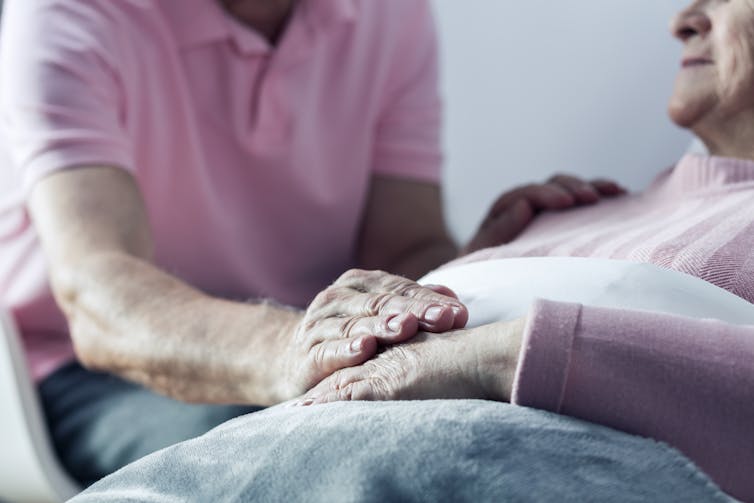
When it comes to talking about death, we have no shortage of euphemisms. This is perhaps most famously illustrated in Monty Python’s dead parrot sketch from 1971. A pet shop worker insists to a customer that his new parrot is “not dead but resting, stunned, pining for the fjords, kipping on his back, tired and shagged out after a long squawk”. The customer responds: “It is an ex-parrot, deceased, gone to the choir invisible, is pushing up the daisies, demised, passed on, is no more, has ceased to be. It’s expired and gone to see its maker, is a bereft of life, late parrot that rests in peace.”
Talking openly about death – and dying – can be difficult. People who have cared for someone who is dying have been shown to feel they can engage more easily with this behaviour. Their experience helps them overcome the barriers that so many of us feel.
Being able to talk about death, dying and loss is an important aspect of what psychologists and palliative care specialists refer to as “death literacy”. This is the practical know-how about how to gain access to, understand and make informed choices about end-of-life and death care options. It directly shapes the decisions we make about the care we receive as well as our ability to care for others.

The 2021 UK census results show that there is a greater proportion of older people in our society than in previous decades. With an ageing population, of course, comes a higher number of deaths and greater pressure on the healthcare system.
Why we don’t talk about death
We conducted an online survey in 2019, where 381 adults in Northern Ireland were asked what prevents them talking more about death and dying.
We found that people feel ill-equipped for talking about death. When talking with someone else about that person’s situation, they worry they might say the wrong thing, or be unable to help that person navigate the emotions these discussions bring up. As one woman put it:
At times you want to avoid upsetting someone even though you know it would be good for them to talk
Conversely, when asked what would encourage them to talk more about death and dying, a young woman suggested:
When you compare the polarity, between birth and death, of how much it is acknowledged, it’s bizarre. Death is just as big a part of life … If we could all embrace it and bring a sense of community and camaraderie to it, it wouldn’t be as dark and frightening.
What is death literacy?
In 2021 we surveyed 8,077 UK adults. Our results showed that in their final days of life the top priorities for most people were to be free of pain and other symptoms, to be in the company of loved ones, and to maintain dignity and respect. Despite this, most reported not having spoken to anyone about their wishes.
We know that as people’s health declines, there is the risk that they may lose the capacity to make important decisions about their end-of-life and death care. So being able to speak out, in advance, is crucial.
There are several aspects to empowering people to be death literate. Talking about death is important, but people also need other skills and knowledge to provide practical support around end of life and death.
We have found that people in the UK often do not know how to navigate the health system at end-of-life or funeral options for themselves or others. Almost half of UK respondents we spoke to reported they did not know where to find information on how to plan for care at the end of life. And more than half of the people we surveyed didn’t know where to find bereavement support.

Public health specialists, including UK charity Compassionate Communities, increasingly recognise that death, dying and loss are both central and inseparable from the social context. In other words, they do not happen in a vacuum. They are as public health sociologist Prof Allan Kellehear reminds us, “everyone’s responsibility”.
Anyone who is either approaching the end of their life, or caring for someone who is dying or grieving the loss of a loved one needs support. And the new public health approach to end-of-life care in the UK advocates that this support is best provided by healthcare providers working in tandem with death literate communities of family, friends and neighbours.
Researchers predict by 2040 most deaths will occur either at home or in care homes. Empowering people to advocate for their own end-of-life care as well as to care for those around them, has never been more important.
Lisa Graham-Wisener does not work for, consult, own shares in or receive funding from any company or organisation that would benefit from this article, and has disclosed no relevant affiliations beyond their academic appointment.
This article was originally published on The Conversation. Read the original article.







